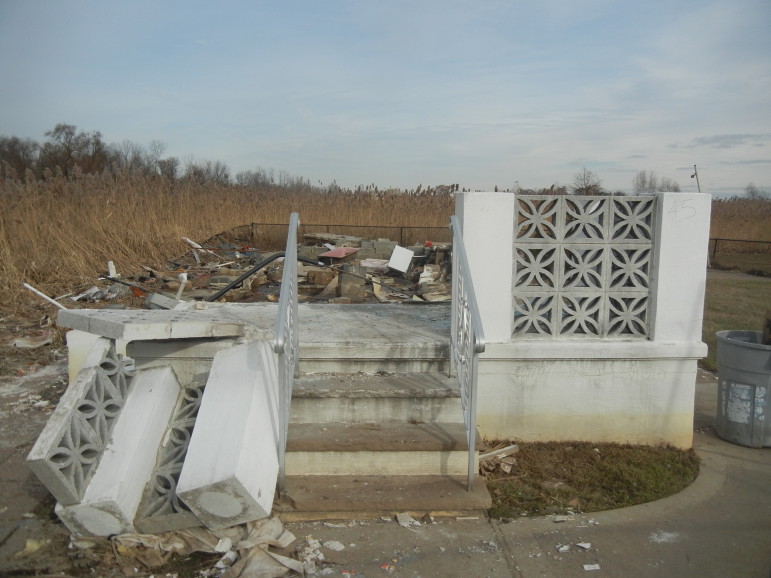
Jarrett Murphy
Damage from Superstorm Sandy in the Oakwood Beach area of Staten IslandGovernor Andrew Cuomo announced on Thursday, during a conference call with reporters, that the Restore Mother Nature Bond Act will be postponed until 2021 due to New York’s financial instability.
“We’re going to postpone the environmental bond issue hopefully one year, to next year, but I don’t think it would be financially prudent to do it at this time,” said Cuomo.
The $3 billion bond act, which is part of Cuomo’s $33 billion, five-year plan to combat climate change, would have appeared on the Nov. 3 ballot. If passed by voters, it would have provided funding for flood-mitigation work, efforts to restore fish and wildlife habitats and projects to assist communities impacted by environmental injustice.
Cuomo’s decision was met with disappointment from environmental organizations in New York, like Riverkeeper and Waterfront Alliance, who had been prepared to raise awareness on the bond act ahead of the November ballot.
Paul Gallay, Riverkeeper’s president and the Hudson Riverkeeper, said that the decision was a missed opportunity to protect the environment and create jobs during this financial crisis. The bond act was projected to create 65,000 jobs within the state.
“Governor Cuomo has done some excellent things for New York’s environment, but this was a bad call,” Gallay said. “This was a missed opportunity.”
Kate Boicourt, the director of resilience at Waterfront Alliance, said that while they understand that the state is facing a pandemic and an economic crisis, they had thought that the importance of funding climate change projects would have helped push the bond act to the ballot.
“Every year we wait on investment like this, we’re exposing ourselves to more risk where we could be kind of already working on flood risk reduction,” said Boicourt.
The Bond Act featured prominently in the policy agenda of Rise to Resilience, a coalition of more than 50 groups in New Jersey and New York that earlier this month released a detailed strategy blueprint of action to brace for the two states’ wetter future.
Councilmember Costa Constantinides, the chair of the Environmental Protection Committee, also expressed his disappointment on twitter, saying that the bond act was needed more than ever.
Terence Cullen, a spokesperson for Constantinides, said that they had been excited for the bond act, which would have potentially funded environmental improvement projects within the city like Renewable Rikers, a proposal to turn Rikers Island into a sustainability hub. It also might have facilitated a five-borough resiliency plan and other projects that would have helped people get back to work.
“We think it’s a shame that it won’t go to voters this year. This recent heat wave as well as warnings that more storms are forming show that climate change is not waiting until 2021,” says Cullen. “Neither can we.”
The bond act would have also set aside funding for restorative projects within communities that have been impacted by environmental injustices.
“This bond act would have reserved 35 percent of the funds available for use in environmental justice communities to help reduce the unfairness and provide some restorative justice in those communities which have suffered unfairly for too long,” said Gallay.
The postponement, Boicourt said, also showed a need for the state to develop a long-term revenue source to deal with flood risks so that there is no need to make year-to-year decisions on whether or not to fund environmental projects.
“In New York State, there’s a surcharge on energy bills that funds’ investments in renewables and infrastructure, and we just don’t have that for flood risk,” said Boicourt. “It’s a disaster that hits every single county in New York State and we don’t really have a way to deal with it.”
Though the Restore Mother Nature Bond Act was only postponed until next year, Gallay said there is no guarantee that it won’t be postponed once again in 2021.
“While we are going to count on the governor and the legislature to get this proposal back on the ballot next year, there is no guarantee that they will,” he said. “So, we’ll hold them to their intention of doing so.”









